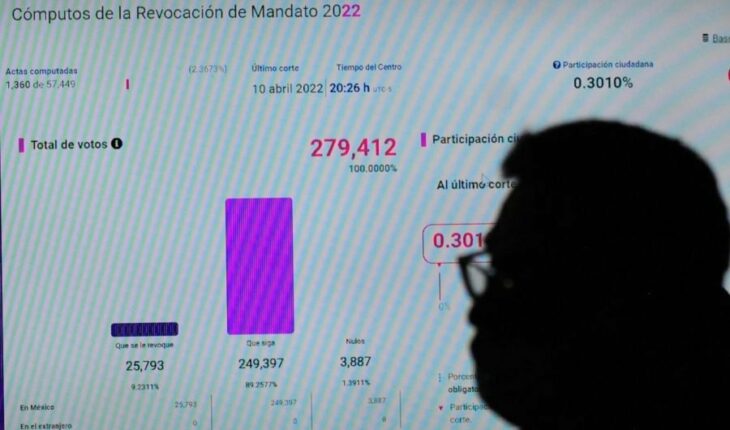In the first consultation to revoke the mandate of a president of the Republic, between 15.7 and 16.8 million citizens participated, equivalent to between 17% and 18.2% of the nominal list of voters, a percentage lower than necessary for the results to be binding: 40%.
According to the percentages of participation thrown by the quick count of the INE, the option that President Andrés Manuel López Obrador continues in office until 2024 was supported by around 15 million people, half of the 30.1 million votes that the Morenista obtained in the 2018 elections.
The option of López Obrador being removed from the federal executive was supported by about 1 million people.
The low citizen participation occurred despite the fact that, throughout the entire organization process and even on the day of the vote, there was a repeated and systematic intervention of public officials who improperly promoted the consultation and the figure of López Obrador.
Morena sought that in the revocation consultation of this Sunday López Obrador was “ratified” at least with the same number of votes of 2018, in order to demonstrate that, in the middle of his mandate, he has not lost citizen support.
In the popular consultation last year, which Morena promoted as the “trial of former presidents”, 6 million 663 thousand citizens participated, so its results were not binding either.
For this consultation of revocation of mandate, 57 thousand 436 boxes were installed, a third of the 156 thousand 807 ballot boxes that there were in 2018.
The reduction is due to the budget cut made by Morena and its allies in Congress to the INE in order to organize this citizen exercise.
However, despite the fact that this time there were fewer ballot boxes, 92.8 million citizens registered on the nominal list were called to participate, almost the same number of potential voters as in 2018.
Public officials, Morena leaders and party supporters blamed the INE for the low citizen participation. Yesterday, during the session of the General Council, the Moreno representative, Mario Llergo, described the councilors as conservatives and reactionaries.
“They have not hesitated for a moment to throw themselves into their arms and put themselves at the service of the darkest reaction and contrary to the interests of the nation, they have repudiated their democratic principles to become a battering ram against the project of nationalist nation and social justice that the people of Mexico voted for by a majority. They oppose not only our president, they oppose the progress and happiness of the nation,” he said.
Gabriela Jiménez, leader of the organization Que Siga la Democracia, which deployed a massive campaign throughout the country in favor of the recall consultation, announced legal actions against the president of the INE, Lorenzo Córdova, and the counselor Ciro Murayama, whom she accused of being biased.
The electoral arbitrator received at least 183 complaints related to the improper actions of public officials and political actors.
The INE asks the prosecutor’s office to investigate possible violations of the law
Although the INE ruled out serious irregularities and described the civic exercise as successful, yesterday’s voting day was marked by violations of the law committed by federal government institutions, public officials and the leader of Morena, Mario Delgado, who, improperly, published on social networks several messages in which they called on citizens to participate in the consultation and promoted the figure of López Obrador, which was sanctioned by the electoral arbitrator.
Even in what was described by Lorenzo Córdova as a possible violation of the General Law on Electoral Crimes, the Moreno leader organized ‘rides’ to transfer citizens to the polls to vote.
Article 7 of the Act provides that anyone who “organises the meeting or transport of voters on election day for the purpose of influencing the direction of the vote” may be punished by a fine of between 50 and 100 days and imprisonment for a period of six months to three years.
In addition, electoral crimes are considered serious and merit informal pretrial detention, thanks to a reform promoted by the current administration.
“The law is very clear: collectively transporting voters to take them to vote for the purpose of influencing the meaning of their vote is a crime, and it is a serious crime; So, I hope that no official or person is committing these crimes. We will be attentive if any complaint comes in that regard. That law (General of Electoral Crimes) is in force as far as I remember, and whoever violates the law, in a State of law, must be applied,” said Córdova in copress conference.
In the afternoon, the Technical Unit of Electoral Litigation of the INE gave a hearing to the Specialized Prosecutor’s Office on Electoral Crimes (FEDE), of the FGR, to investigate Delgado’s actions.
With information from Arturo Ascención.
What we do at Animal Político requires professional journalists, teamwork, dialogue with readers and something very important: independence. You can help us keep going. Be part of the team.
Subscribe to Animal Político, receive benefits and support free journalism.#YoSoyAnimal





